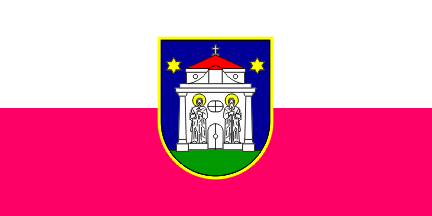
by Zeljko Heimer, 29 October 2003

Last modified: 2003-11-15 by dov gutterman
Keywords: osijek | baranja | osjecko-baranjska | croatia | osijek baranja | djakovo | st. peter | st. paul |
Links: FOTW homepage |
search |
disclaimer and copyright |
write us |
mirrors

by Zeljko Heimer, 29 October 2003
See also:
Other sites:
Adopted: 16 November 1993. The Coat of Arms pictures the
vestry church of All Saints, and infront of it St. Peter (holding
a book and a key) and St. Paul (with a book and a sword).
Source: The Republic of Croatia Ministry of Administration
Decision, 16 November 1993 (Klasa: UP/I-017-02/93-01/03, URBROJ:
515-04-03/1-93-2).
Zeljko Heimer
Djakovo (i.e. Šakovo) is a ciyt with about 30,000 inhabitants
in the entire area, and some 20,000 in the urban settlement
itself. It is some 35 km southeast of Osjiek.
It is the seat of the diocese of Djakovo and Srijem which
inherits the diocese of Bosnia after the Turkish conquest in 14th
century. The city itslef is first mentioned in 13th century, and
in 1349 the seat of Bosnian diocese is moved there. Yet it was
conquered by Turks in 16th century and liberated only in the end
of 17th century (when most of the city was burnt down). From the
Turkish time is preserved the Hadjipasha mosque, after the
liberation rearranged into the parish church of All Saints
(though the mosque is still clearly observable in style, one of
the rare such buildings in Catholic Europe). In 19th century the
baroque fasade was added to it. This is the facade shown on the Coat of Arms.
The purpore stripe in the flag, no doubt, refers to the bishops
whoc built the city. The break of the rule of the monocoloured
flags for cities must be due to the fact that the Ministry of
Administration granted the approval for its use already in 1993,
i.e. before October 1994 when the rules for monocoloured flags
was established.
Zeljko Heimer, 29 October 2003